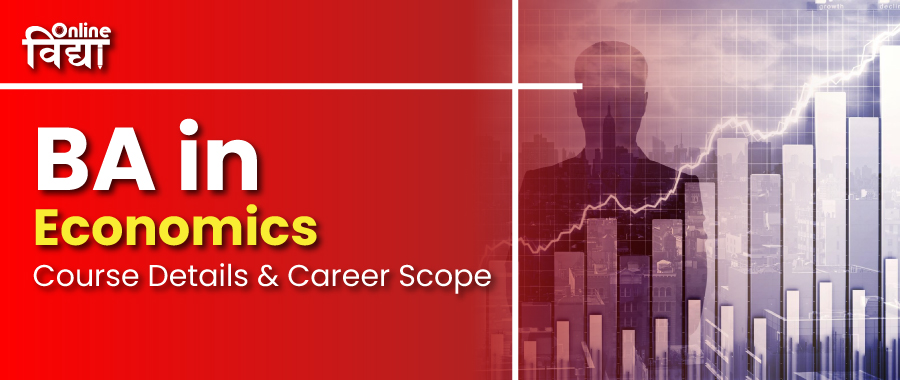Specializations
Courses Available
Courses

BA in Economics: Course Details & Career Scope
BA in Economics: Course Details & Career Scope,Feb 13, 2025
Online BA
Feb 13, 2025
2082 Views
- Share:
The BA in Economics concentrates on economic theories, econometrics, applied economics, and many more. A student can pursue BA studies in Economics after passing the 12th class board examination. Economics BA courses are in great demand in all colleges and institutes nationwide. Economics deals with large data; hence the need for statistics is very much implied in the curriculum.
Over the last decade, this course has reputedly become a lot more popular with some opportunities being offered. The entry-level packages for BA Economics graduates range between INR 4 to 7 LPA.
Course Highlights
Particulars | Highlights |
Course Level | Undergraduate |
Course Duration | 3 years |
Course Eligibility Criteria | 10+2 pass from a recognized board. |
Examinations Type | Semester-Wise |
Average Course Fees | INR 20,000 to INR 1,50,000 per annum |
Job Profiles | Economic Consultant, Investment Analyst, Actuarial Analyst, Auditor, And Economic Writer |
Average Salary Package | INR 2 to 15 LPA |
Top Recruiters | KPMG, The Economist, World Bank, IMF, CRISIL, etc. |
Why BA in Economics?
The following are some notable points that might help you choose to study BA in Economics:
- Career Prospects: The Economics degree can take you into different industries and areas. It allows economists to work in diverse fields like business, government, academic, and private industrial areas.
- Strong Fundamental Knowledge: Due to immense flexibility and vast subjects covered under economics, it somehow forms the basis of many highly reputable careers.
- Challenges: Economics puts intellectual challenges in your coursework and makes use of critical thinking skills. Several challenges will expose you to the understanding of global economics and how it relates to several aspects of business throughout the course.
Eligibility Criteria
The following will qualify students to apply for the BA in Economics program:
- The candidates should have passed an examination or graduated from a recognized board with a class XII certificate and have secured a minimum of 50 percent marks.
- Special consideration is also given to students of science and commerce, although the primary applicants are those from class XII arts.
Course Curriculum
Semester 1
| Semester 2
|
Semester 3
| Semester 4
|
Semester 5
| Semester 6
|
Course Career Options
The BA economics students can find jobs in both the sector of Government and Private. The salary range, on average, starts from INR 2 to 5 lakh per annum for an undergraduate in economics.
What attracts one most to studying BA in economics is the job opportunities it offers. Some job titles available to the students after completing the course are provided below for reference.
Job Profiles | Average Salary Ranges |
Investment Banker | INR 11 LPA |
Financial Analyst | INR 5 LPA |
Stock Broker | INR 3 LPA |
Auditor | INR 6 LPA |
Investment Analyst | INR 2.5 LPA |
Economic Writer | INR 6.5 LPA |
Actuarial Analyst | INR 9.4 LPA |
FAQs
Is a BA in economics very useful?
An economics degree provides a solid basis for any financial career. The common career path is toward data analysis, either as an actuary or investment analyst. For those wanting to go forward in this world, one should pursue further studies.
Do economists make decent money?
The Bureau of Labor Statistics trusts the national average annual salary of individuals working as economists is $132,650-more than twice the average annual salary for all occupations-$51,960. But, the average package for economists varies considerably with geography.

Meet Our Counselling Experts
Get 100% Free Career Counseling




PlacementPartners










Schedule Your 30 min Couselling Session With Today!!
Select a Date of your choice :
You Have Selected Slot on .

